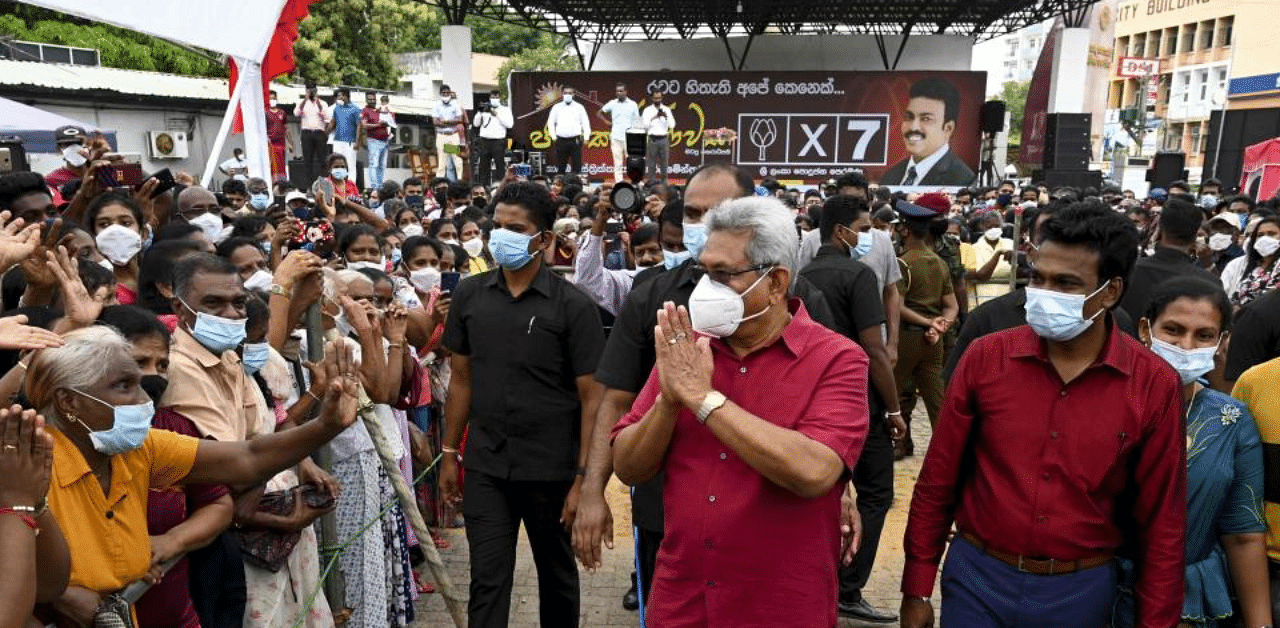
Sri Lanka, which a decade ago emerged from a devastating civil war but last year was rocked again by a series of deadly suicide bombings, will hold parliamentary elections on Wednesday.
President Gotabaya Rajapaksa and his older brother Mahinda, the prime minister, hope to secure sweeping powers to govern.
Here is a look at Sri Lanka:
The teardrop-shaped tropical island off the southern tip of India is separated from the subcontinent by a shallow strip of sea known as the Palk Strait that is about 20 kilometres (12 miles) wide at the narrowest point.
The island has a population of 21.8 million, according to the World Bank in 2019.
Seventy per cent are Buddhist, mostly ethnic Sinhalese. Around 12 per cent are Hindus -- mostly Tamils, who mainly live in the north and northeast of the island.
Muslims make up 10 per cent of the population and Christians about seven per cent.
A strategic point on early maritime trade routes, the Indian Ocean island was controlled by Portugal (1505-1656) then The Netherlands (1656-1796) before becoming a British colony called Ceylon in 1815.
The last Sinhalese king reigned from 1798 to 1815.
After more than 130 years of British rule, the island gained independence in 1948.
In 1972 it became a republic and adopted the name Sri Lanka.
In 1972 Tamil rebels launched an armed struggle for a separate homeland that triggered a nearly four-decade civil war estimated to have claimed up to 100,000 lives.
The Liberation Tigers of Tamil Eelam (LTTE) campaign was marked by suicide bombings and assassinations, including of president Ranasinghe Premadasa in 1993, and it was labelled a terrorist group by some Western nations and India.
After a ceasefire failed, the Sinhalese-majority government crushed the Tigers in an all-out military offensive in 2009, killing their founder and leader Velupillai Prabhakaran.
The operation that crushed the Tigers was criticised for its brutality, with troops accused of killing at least 40,000 Tamil civilians.
The United Nations Human Rights Council has demanded an independent investigation into war crimes in the conflict.
After coming to power in November 2019, Rajapaksa withdrew Sri Lanka from a UN resolution calling for action over the alleged rights abuses and in May 2020 he threatened to pull out of the UN Human Rights Council if it pursued the war crimes claims.
Rajapaksa was the top defence official when the rebels were defeated under his brother, former president Mahinda Rajapaksa.
Sri Lanka was about to mark a decade since the end of the Tamil separatist war when its capital was struck by new terror attacks on Easter Sunday in 2019.
A series of suicide bombings on three packed churches and three luxury hotels on April 21, 2019, killed 279 people, including at least 45 foreigners, and injured nearly 600 people.
The extremist National Thowheeth Jama'ath (NTJ), that had pledged allegiance to the Islamic State militant group, was held responsible for the audacious bombings.
Sri Lanka's main export is tea, with more than 90 per cent of its production traded abroad. It ranks with China and Kenya as the top international exporters.
The garment industry and remittances from workers abroad are also key sources of revenue.
Following the end of the civil war, international tourism flourished in Sri Lanka with more than two million visitors per year since 2016 compared to 448,000 in 2009.
But the Easter bombings battered the industry, and the Covid-19 pandemic has inflicted more pain, with hotels shuttering and flights grounded.
Growth is estimated to have been 2.6 per cent in 2019, an 18-year low, according to the World Bank.
The Asian Development Bank forecasts that Sri Lanka's economy could record its biggest-ever annual contraction of 6.1 per cent this year.